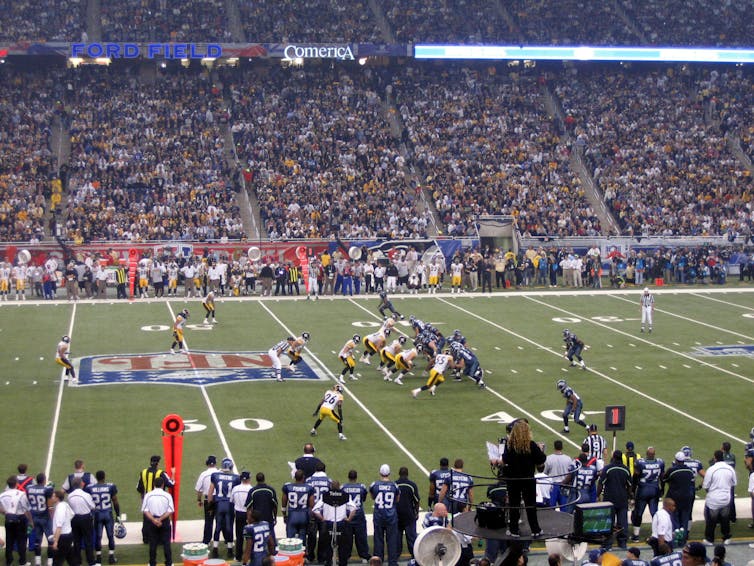Is it immoral to watch football?
- Written by Francisco Javier López Frías, Assistant Professor of Kinesiology, Pennsylvania State University
For a large swath of Americans, fall means football. But, as in previous years, this season’s football has been mired in controversy.
Most notable of these has been the Colin Kaepernick case. Kaepernick has accused the NFL[1] of colluding to keep him off the field because of his protests against police brutality and racial inequality during the playing of the national anthem. A recent ruling has granted him a full hearing[2] in the dispute.
And this hasn’t been the only controversy. Scientific findings have shown that regular practice of football increases the risk of brain diseases[3]. Allegations regarding the intrinsic violent nature of the game[4] and an increasing commercialization of the sport[5] have been the subject of recent headlines as well.
For fans who consider the sport from an ethical perspective, all these issues raise a question: Is watching football morally problematic?
Football injuries
At its core, football demands skill and tactical acumen. Indeed, as philosopher Alexis C. Michalos[6] said more than four decades ago[7],
“There’s something admirable about the performance of an excellent running back, a scrambling quarterback or a defensive player with the knack of being in the right place at the right time. Anyone who has tried to match such performances must admire them.”
However, in the way it is currently practiced, football is seriously dangerous for players.
Repetitive brain trauma makes football players highly vulnerable to chronic traumatic encephalopathy, a neurogenerative disease. A 2017 study found that 99 percent of deceased NFL players[8] who had donated their brains to scientific research suffered from this disease.
 The risk of injuries for football players is comparatively higher.
Melissa Doroquez/Flickr.com, CC BY-SA[9][10]
The risk of injuries for football players is comparatively higher.
Melissa Doroquez/Flickr.com, CC BY-SA[9][10]
In addition, football players suffer the most injuries[11] among athletes. A study of the injury rates among high school student-athletes estimated that the injury rate for football was twice that of soccer or basketball.
Culture of violence?
In his blistering 1991 poem “American Football[12],” British writer Harold Pinter, winner of the 2005 Nobel Prize in literature, depicts the sport as “deliberately” violent. Aimed at satirizing the violent character of the Gulf War, Pinter portrays war and football as being intimately connected.
As scholars[13] who study the ethics of sport[14], we would argue that while football does require the use of bodily force, it is not that football is inherently violent. Sport philosopher Jim Parry[15], for example, contests this claim by defining violence as involving “intentional hurt or injury to others[16].”
It is not inherent violence but a culture of violence around the sport that is troubling.
Nate Jackson, a former football player, describes in his 2013 memoir, “Slow Getting Up,”[17] that for most of his colleagues, the main rewards of the sport relate to violence. For instance, one of the main lessons players must learn to be successful is “decide what you’re going to do and do it violently.”
Similarly, Don DeLillo[18] compellingly captured the rhetoric and ethos of violence[19] surrounding football in his 1972 novel “End Zone.” Gary, the book’s running-back narrator, describes football in militaristic language that resembles warfare.
Furthermore, far from being ideologically neutral, some commentators argue football appeals to conservative values. Registered Republicans have been found more likely to be NFL fans[20] than registered Democrats. Perhaps this could explain President Donald Trump’s denunciation of players who decided not to stand for the pregame national anthem.
More about money?
As for its commercialization, consider the following: In the last decade, the NFL has raked in billions in lucrative broadcasting rights deals. Verizon paid over US$2 billion for five years[21] for the right to stream NFL games across its digital platforms.
It is true, as philosopher Alasdair MacIntyre[22] contends, social practices need institutions to flourish[23]. In turn, institutions require financial resources to accomplish that goal. The problem, however, comes when institutions pursue those resources at the expense of the very virtues and values that define those practices.
In the case of football, it could be argued that the form and skills that make it appealing are now a model for revenue generation. In doing so, its inherent virtues and values have been deemphasized, in favor of market values.
As Michael Oriard[24], a former football player and historian, contends[25], the story of NFL football “is necessarily about money, lots of money. Professional football has always been about money.” The commercial aspect has become even more prominent as a result of its commodification as a television product.
These days the litany of television commercial breaks has not only negatively impacted[26] the length and pace of games but also driven fans’ attention away from football. Indeed, NFL Commissioner Roger Goodell admitted that the league worried[27] about the impact of commercials in the flow and pace of the game.
What are the ethics?
 Football is an important part of America’s shared culture.
sunshine.patchoulli/Flickr.com, CC BY-NC-ND[28][29]
Football is an important part of America’s shared culture.
sunshine.patchoulli/Flickr.com, CC BY-NC-ND[28][29]
Historians point out that the Super Bowl is America’s largest shared cultural experience[30]. It could be argued that football fans learn to speak and shape their national identity[31] by, among other things, engaging in the sport. Football, in other words, embodies and reveals the main values of the culture, playing a key role in shaping the way in which Americans imagine their common national identity.
Considering all the morally problematic aspects surrounding football, it is worth asking: Is this the kind of social practice around which Americans should imagine and build their national identity?
Editor’s note: This piece is part of our series on ethical questions arising from everyday life. We would welcome your suggestions. Please email us at ethical.questions@theconversation.com[32].
References
- ^ accused the NFL (www.si.com)
- ^ granted him a full hearing (www.nytimes.com)
- ^ risk of brain diseases (www.sciencenews.org)
- ^ intrinsic violent nature of the game (www.denverpost.com)
- ^ commercialization of the sport (www.washingtonpost.com)
- ^ Alexis C. Michalos (www.miqols.org)
- ^ said more than four decades ago (www.tandfonline.com)
- ^ 99 percent of deceased NFL players (www.sciencenews.org)
- ^ Melissa Doroquez/Flickr.com (www.flickr.com)
- ^ CC BY-SA (creativecommons.org)
- ^ suffer the most injuries (www.ncbi.nlm.nih.gov)
- ^ American Football (www.haroldpinter.org)
- ^ scholars (scholar.google.com)
- ^ ethics of sport (www.brockport.edu)
- ^ Jim Parry (www.leeds.ac.uk)
- ^ “intentional hurt or injury to others (www.routledge.com)
- ^ “Slow Getting Up,” (www.harpercollins.com)
- ^ Don DeLillo (perival.com)
- ^ captured the rhetoric and ethos of violence (archive.nytimes.com)
- ^ Registered Republicans have been found more likely to be NFL fans (www.marketresearchworld.net)
- ^ over US$2 billion for five years (www.businessinsider.com)
- ^ Alasdair MacIntyre (philosophy.nd.edu)
- ^ need institutions to flourish (www.bloomsbury.com)
- ^ Michael Oriard (scarc.library.oregonstate.edu)
- ^ contends (www.cambridge.org)
- ^ negatively impacted (www.forbes.com)
- ^ league worried (www.nfl.com)
- ^ sunshine.patchoulli/Flickr.com (www.flickr.com)
- ^ CC BY-NC-ND (creativecommons.org)
- ^ America’s largest shared cultural experience (doi.org)
- ^ football fans learn to speak and shape their national identity (www.tandfonline.com)
- ^ ethical.questions@theconversation.com (theconversation.com)
Authors: Francisco Javier López Frías, Assistant Professor of Kinesiology, Pennsylvania State University
Read more http://theconversation.com/is-it-immoral-to-watch-football-103081

